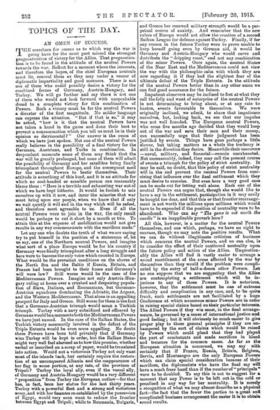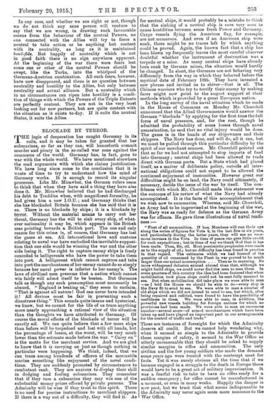TOPICS OF THE DAY.
AN OMEN OF SUCCESS.
THE searchers for omens as to which way the war is going have for the most part missed the strongest prognostication of victory for the Allies. That prognostica- tion is to be found in the attitude of the neutral Powers towards the war. Reflect for a moment where the interests, and therefore the hopes, of the chief European neutrals must lie, conceal them as they may under a veneer of diplomatic impartiality and good manners. There is not one of them who could possibly desire a victory for the combined forces of Germany, Austria-Hungary, and Turkey. We will go further and say there is not one of them who would not look forward with unspeakable dread to a complete victory for this combination of Powers. Such a victory must be for the neutral Powers a disaster of the first magnitude. No milder language can express the situation. "But if that is so," it may be asked, "how is it that the neutral Powers have not taken a hand in the game and done their best to prevent a consummation which you tell us must be in their opinion so detrimental ? " Our answer is the onion of which we have just spoken. Not one of the neutral Powers really believes in the possibility of a final victory for the Germane, Austrians, and Turks in combination. In despondent moments some of them may think that the war will be greatly prolonged, but none of them will admit the possibility of Germany and her satellites being finally triumphant throughout Europe, and the consequent need for the neutral Powers to bestir themselves. Their attitude is something of this kind, and it is an attitude for which no cool-headed or sensible person can reasonably blame them : "Here is a terrible and exhausting war out of which we have kept hitherto. It would be foolish to mix ourselves up with it now, and incur the miseries that war must bring upon our people, when we know that if only we wait quietly it will end in the way which will be safest, and therefore most agreeable to us. Even if all the neutral Powers were to join in the war, the only result would be perhaps to cut it short by a month or two. To attain this at the expense of mobilization would not give results in any way commensurate with the sacrifices made."
Let any one who doubts the truth of what we are saying try to put himself in the position of a statesman of, let us say, one of the Northern neutral Powers, and imagine what sort of a place Europe would be for his country if Germany were finally triumphant after a long struggle and hers were to become the only voice which counted in Europe. What would be the prevalent conditions on the shores of the North Sea and the Baltic if Russia, Britain, and France had been brought to their knees and Germany's will were law ? Still worse would be the case of the Mediterranean Powers. Imagine not only Austria-Hun- gary ruling at home over a crushed and despairing popula- tion of Slave, Italians, and Roumanians, but Germano- Austrian squadrons dominating the Adriatic, the Aegean, and the Western Mediterranean. That alone is an appalling prospect for Italy and Greece. Still worse for them is the fact that a Germano-Austrian triumph would mean a Turkish triumph. Turkey with a navy subsidized and officered by Germane would be a menace to both the Mediterranean Powers we have just named. In the case of the Balkan States, the Turkish victory necessarily involved in the defeat of the Triple Entente would be even more appalling. No doubt these Powers have been told privately that if Germany wins Turkey will be kept in order, but the Balkan States might very well feel alarmed as to how this promise, whether verbal or inscribed on &scrap of paper, would be translated into action. Would not a victorious Turkey not only want most of the islands back, but certainly require the restora- tion of an unconquered Albania and the reappearance of her flag in seine portion, at any rate, of the province of Tripoli? Turkey the loyal aliy, even if the vassal ally, of Germany and Austria-Hungary would be a very different " proposition" from Turkey the European outlaw—for that, Las, in fact, been her status for the last thirty years. Turkey with a powerful fleet and a strong and victorious army, and with her finances re-established by the possession 01 Egypt, would very soon want to redraw _the frontier between Egypt and Tripoli; while to Roumania, Bulgaria, and Greece her renewed military strength would be a per- petual source of anxiety. And remember that the new rulers of Europe would not allow the creation of a second Balkan League for defence against Turkey. Finally, if for any reason in the future Turkey were to prove unable to -keep herself going even by German aid, it would be Germany and Austria-Hungary who would carve and distribute the "dripping roast," and not any combination of the minor Powers. Once again, the neutral States of the Near East and the Mediterranean could not view the war with the philosophic calm with which they are now regarding it if they had the slightest fear of the ultimate defeat of the Triple Entente. In the attitude of the neutral Powers better than in any other omen we can find good assurance for the future.
Impatient observers may be inclined to fret at what they call the folly and want of enterprise of the neutral Powers in not determining to bring about, or at any rate to hasten, events favourable to themselves. We were originally inclined, we admit, to share that impatience ourselves, but, looking back, we see that our impulse was not well founded. The European neutral Powers, who some five months ago decided that they would keep out of the war and save their men and their money, can successfully urge that their judgment has been justified by events. Things have gone perhaps a little slower, but taking matters as a whole the tendency is still in the direction they desire. Meanwhile their resources —naval, military, and financial—remain nnexhausted. Not unreasonably, indeed, they may call the present course of events a triumph for the policy of strict neutrality. It may be said, no doubt, that this policy of strict neutrality will in the end prevent the neutral Powers from exer- cising that influence over the final settlement which they must desire to exercise. But even here a very good case can be made out for letting well alone. Each one of the neutral Powers can argue that, though she would like to have a any in the settlement, participation in it may easily be bought too dear, and that this or that frontier rearrange- ment is not worth the millions upon millions which would have to be expended if the position of neutrality were to be abandoned. Who can say "The game is not world the candle" is an inapplicable proverb here ?
All this, however, is a matter for the neutral Powers themselves, and one which, perhaps, we have no right to canvass, though we may note the positive results. What we can do without illegitimate criticism of business which concerns the neutral Powers, and no one else, is to consider the effect of their continued neutrality upon the future policy and action of the Allies. Unquestion- ably the Allies will find it vastly easier to arrange a sound resettlement of the areas affected by the war by themselves than they would if the problem were compli- cated by the entry of half-a-dozen other Powers. Let no one suppose that we are suggesting that the Allies are contemplating a settlement which will be in- jurious to any of those Powers. It is notorious, however, that the settlement must he one of extreme difficulty and complication in any case, and, to be quite frank, such settlements are not facilitated by a huge Conference at which numerous minor Powers are in order in raising special claims based on their particular interests. The Allied Powers if they win must, in the final arrange- ments, be governed by a sense of international justice and good feeling.; but it will obviously be much easier to give proper play to those general principles if they are un- hampered by the sort of claims which would be raised by Powers which could plead that they had played the part of combatants and made sacrifices in blood and treasure for the common cause. As far as the European situation is concerned, we may say with certainty that if France, Russia, Britain, Belgium, Servia„ and Montenegro are the only European Powers which can claim special consideration because of their sacrifices, the diplomatists who have the final say will have a much freer hand than if the numbernf " principals* were to be doubled. To say this is not to suggest for a moment that any Power is to be left out in the cold or penalized in any way for her neutrality. It is merely a recognition of what we may almost describe as a physical fact—tire fact that the fewer the parties to a great and complicated business arrangement-the easier It is to obtain sound results. In any case, and whether we are right or not, though we do not think any sane person will venture to say that we are wrong, in drawing such favourable omens from the behaviour of the neutral Powers, no one connected with the Allies will try to force a neutral to take action or be anything but content with its neutrality, ae long ae it is maintained bend-fade. But happily of neutrality which is not in good faith there is no sign anywhere apparent. At the beginning of the war there were fears lest some one or other of the neutral Powers should be swept, like the Turks, into the whirlpool of the Germano-Austrian combination. All such fears, however, have now disappeared, and there is no question between neutrality and hostility to the Allies, but only between neutrality and actual alliance. But a neutrality which in no circumstances can ripen into hostility is a condi- tion of things with which the Powers of the Triple Entente are perfectly content. They are not in the very least looking out for new partners, but are quite content with the situation as it exists to-day. If it suits the neutral States, it suits the Allies.







































 Previous page
Previous page